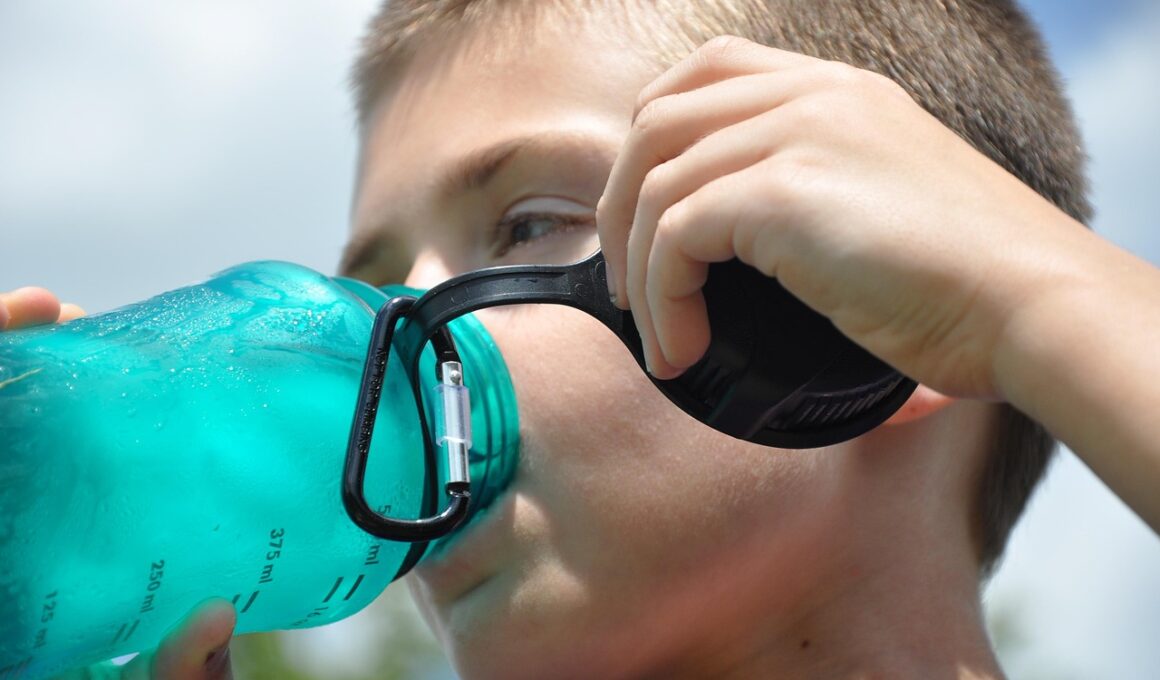Hydration and Stress Management: Insights from Sports Science
Understanding the relationship between hydration and stress management is pivotal for both athletes and general individuals seeking improved well-being. Research indicates that water plays an essential role in physiological functions, especially during periods of stress. Maintaining proper hydration can enhance cognitive performance, reduce fatigue, and counteract stress-induced challenges. Sports science reveals that even mild dehydration can impair mood, increase perceived difficulty, and elevate stress hormones. These findings underscore the importance of staying hydrated not just for physical performance, but also for mental resilience. It is crucial to develop effective hydration strategies tailored to individual needs, considering factors such as activity level, climate, and personal health. In practice, this means individuals should make a conscious effort to drink water regularly throughout the day. Additionally, during intense physical activity, replenishing lost fluids becomes critical. Therefore, setting reminders or incorporating hydration into daily routines may help, especially in stressful environments. Moreover, choosing hydrating foods, such as fruits and vegetables, can boost overall water intake. Through these measures, hydration can serve as a strategic tool in managing stress effectively.
The Science Behind Hydration and Stress
The physiological mechanisms linking hydration and stress are fascinating and complex. Water, vital for life, assists in numerous bodily functions, including nutrient transport and thermoregulation. When dehydrated, the body experiences increased cortisol production, a hormone closely associated with stress response. Studies show that stress can exacerbate the symptoms of dehydration, leading to a cycle that significantly affects mental health. Furthermore, dehydration can lead to reduced blood flow to the brain, resulting in impaired cognitive abilities, such as focus and memory. Maintaining hydration can combat these adverse effects; thus, athletes should stay ahead of hydration needs. Frequent water consumption aids in reducing cortisol levels, mitigating the body’s stress response. Additionally, it enhances performance by optimizing organ function and ensuring efficient energy utilization. To fully benefit from hydration, individuals should adopt regular fluid intakes before, during, and after exercise. Recommendations often suggest consuming electrolytes along with water during prolonged activities. This strategy helps in replacing essential minerals lost through sweat, further supporting physical and mental resilience amidst stressors. Thus, hydration serves not only as an essential need but also as a psychological advantage to counter stress.
Incorporating effective hydration strategies into daily life can lead directly to improved stress management. Physical activity often causes increased fluid loss through perspiration. Hence, anticipating needs during training sessions is crucial. Carrying a water bottle during workouts can ensure easy access to hydration. Additionally, consuming fluids continuously throughout the day can prevent the pitfalls of dehydration. Choosing beverages wisely, such as herbal teas or coconut water, can further elevate hydration levels. Moreover, obviously, separating intake patterns between intense workouts and recovery periods is necessary. During recovery, individuals should aim to replace lost fluids to support recovery and mental clarity. Scheduling regular breaks for hydration during practices can also be beneficial, particularly in high-pressure environments. Engaging in recreational hydration strategies can turn the mundane into exciting opportunities. Enjoying flavored water or herbal infusions can make drinking fluids more appealing. Maintaining hydration can also promote healthier eating practices, resulting in a beneficial cycle affecting both physical and cognitive performance. Remember, being proactive in hydration leads to effective stress management, contributing significantly to well-being during athletic pursuits and daily life.
Hydration Techniques for Athletes
Athletes can enhance performance through practical hydration techniques that specifically address their unique needs. Utilizing hydration strategies tailored for sports provides an edge over competitors and better stress control. One essential technique is to assess preexercise hydration levels. Athletes should weigh themselves before and after workouts to gauge fluid loss accurately. This provides insights into rehydration needs and helps establish baseline hydration levels. Furthermore, understanding sweat rates can inform hydration practices significantly. Athletes may consider structured post-exercise recovery drinks containing electrolytes. This can help replenish essential nutrients lost during training sessions swiftly. Timing fluid replacement is also vital; ideally, rehydration should start during exercise and continue afterward. Encouraging a regular pattern of sipping fluids rather than consuming large amounts at once is recommended. Also, monitoring urine color provides a simple visual guide to hydration status; pale yellow signifies adequate hydration. Additionally, athletes can optimize hydration by incorporating hydrating foods into their diets, such as watermelon and cucumbers. These practical hydration techniques empower athletes to manage stress effectively while optimizing overall performance.
Beyond the physical benefits, hydration also constitutes an essential part of mental health management. Notably, hydration can improve mood and cognitive function, which are critical factors influencing one’s ability to handle stress. Dehydration can lead to irritability and heightened anxiety levels. Conversely, proper hydration promotes emotional stability and overall mental clarity. Sports science suggests that even mild dehydration can interfere with concentration and elevate perceived exertion levels in physical tasks. This connection emphasizes the importance of maintaining hydration as a preventive measure against stress-related challenges. Mindfulness in hydration practices can also amplify the mental benefits associated with proper fluid intake. Practicing gratitude for every glass of water helps create a positive association with hydration. For individuals facing high-stress situations, meaningful connections during hydration moments can offer a moment of pause and reflection. Engaging in deep breathing or visualization techniques while drinking water fosters relaxation, further aiding stress management. So, integrate hydration into mindfulness practices, enhancing emotional well-being and physical performance. This holistic approach highlights how essential proper fluid intake is to enhance daily resilience against stressors.
Incorporating Hydration into Lifestyle
Establishing a consistent hydration routine can significantly enhance stress management in daily life. Set specific goals for fluid intake, allowing individuals to strive for improved hydration intentionally. Tracking daily water consumption, using journals or apps, provides insights into habits and patterns. Moreover, associated hydration goals with routines can promote added consistency. For instance, drinking a glass of water after every meal or during work breaks can easily fit between various daily activities. Additionally, utilizing reminders on digital platforms can prompt timely hydration; the portability of smartphones makes this approach effective. Incorporative social elements, like participating in hydration challenges, can also create a sense of community focused on healthy habits. Developing a supportive environment surrounding hydration can lead to collective accountability. Moreover, family members can encourage considering hydration a shared commitment. Adjusting personal preferences concerning flavor and type of hydration—infusing flavors, adding fruits, or exploring different herbal teas—enhances overall enjoyment associated with drinking water. Ultimately, prioritizing hydration as an essential component of one’s lifestyle results in improved physical performance and better stress management.
In conclusion, understanding the interplay between hydration and stress is crucial. Hydration strategies play an integral role in enhancing physical performance and mental well-being. From athlete-focused techniques to everyday applications, effective hydration promotes resilience against stressors. Through meticulous planning and consistent practices, individuals can significantly improve hydration and, consequently, their ability to manage stress. Furthermore, including hydrating foods, monitoring body signals, and cultivating a mindful approach to hydration can transform fluid intake habits. As research continues to unveil more about hydration’s influence on the mind and body, it remains clear that staying adequately hydrated is fundamental for living an active and fulfilling life. Therefore, prioritizing hydration in all activities fosters a proactive approach to overall health. Encouraging collaboration among peers and seeking support when necessary can establish a strong foundation for commitment to hydration strategies. In a world where stress is prevalent, maintaining hydration should not just be a consideration but a lifestyle choice. Adopting these practices enables effective stress management, ensuring individuals are capable of facing challenges head-on. Ultimately, hydration serves as a pathway to enhanced performance, well-being, and overall life satisfaction.
This article sheds light on the link between hydration and effective stress management, inferring valuable insights from sports science. Hydration is not just crucial for athletes; it extends comprehensively to adults managing daily stressors. Staying well-hydrated can bolster cognitive functions that often become impaired due to stress and fatigue. Moreover, hydration can decrease levels of cortisol, the stress hormone, thereby helping to promote a calmer state of being. For individuals engaged in high-stress jobs, incorporating hydration strategies can serve as a foundational benefit, establishing a pivotal link between physical health and emotional stability. Research consistently indicates that a well-hydrated body is more resilient against stress, enabling better response mechanisms during difficult situations. Additionally, no one should overlook the vital role hydration plays in enhancing overall physical performance. Without adequate hydration, the body experiences a decline in physical capabilities and mental agility, both of which are necessary for effectively managing stress. Therefore, by providing adequate hydration, one can establish a robust defense against stress, underlining why ongoing education on hydration practices remains paramount.


